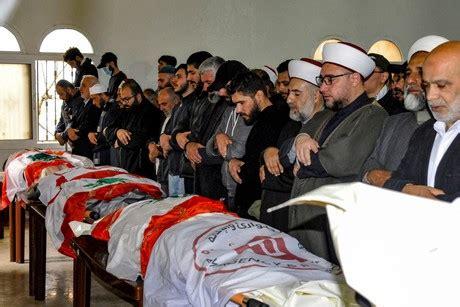
Jamaa Islamiya, Lebanese Militants Allied To Hamas
Jamaa Islamiya has a much lower profile than other militant groups in Lebanon, but the escalation of strikes over the border with Israel is pushing it into the spotlight.
Formed in the 1960s, Jamaa Islamiya claims to have carried out operations with Palestinian militant group Hamas in southern Lebanon and said seven affiliated rescuers were killed in an overnight Israeli strike.
Several groups allied to Hamas have exchanged near-daily fire with Israeli forces along Lebanon’s southern border since war erupted in the Gaza Strip following Hamas’s October 7 attacks on southern Israel.
The groups say they are acting in solidarity with Hamas and Palestinians in the Gaza Strip.
Jamaa Islamiya has carried out “joint operations with Hamas” in Lebanon, according to an official from the small Sunni Muslim movement who requested anonymity as they were not authorised to speak to the media.
“All forces that operate in south Lebanon coordinate their actions,” Ali Abu Yassin, head of Jamaa Islamiya’s political bureau, told AFP.
As the group announced the death of the seven medics on Wednesday, the Israeli military said those killed were Jamaa Islamiya “terrorists”.
Mohanad Hage Ali, from the Carnegie Middle East Center, said Jamaa Islamiya was “operating as an extension of Hamas in Lebanon”, describing the two movements’ relationship as “organic”.
Over the weekend, a Jamaa Islamiya official reportedly survived an Israeli drone strike in eastern Lebanon and earlier this month the group said three of its fighters were killed in Lebanon’s south.
The official requesting anonymity said two Jamaa Islamiya members were serving as bodyguards to Hamas deputy leader Saleh al-Aruri and were killed along with him in a January 2 strike on Beirut’s southern suburbs.
Hage Ali said Jamaa Islamiya had “around 500 armed men” but played only a “marginal political role” in Lebanon with just one lawmaker in the national parliament.
Jamaa Islamiya and Hamas both come from the same ideological school as the Muslim Brotherhood, a Sunni Islamist group with origins in Egypt, the official requesting anonymity said.
Jamaa Islamiya established its armed wing, the Fajr Forces, in 1982 to fight the Israeli invasion of Lebanon.
The official said the group stayed out of Lebanon’s 1975-1990 civil war.
Relations with Hezbollah have seen ups and downs but improved recently, analyst Hage Ali said, particularly since Jamaa Islamiya elected a new leadership closer to Hamas in 2022.
But Hage Ali noted Jamaa Islamiya “is not subservient” to Hezbollah.
The two groups differ in particular over the Syrian conflict, with Hezbollah supporting Syrian President Bashar al-Assad since his 2011 repression of anti-government protests sparked war, unlike Hamas and Jamaa Islamiya.
Jamaa Islamiya political official Abu Yassin acknowledged his group had “differences of opinion with Hezbollah due to its participation in the Syrian war on the side of the regime”.
The Jamaa Islamiya official requesting anonymity said that though the groups differ over Syria, “today, we are in the same trench as Hezbollah on the Palestinian issue”.
Source » barrons.com





